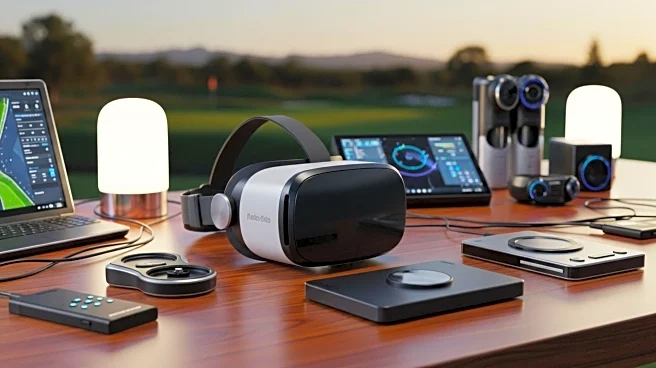What's Happening?
Team Europe has adopted virtual reality (VR) technology to simulate the noise and atmosphere expected at the Bethpage Black course during the Ryder Cup. The initiative, led by Luke Donald, aims to acclimate players to the potentially raucous environment they will face. Rasmus Højgaard described the VR experience as a 'fun little gimmick,' while Justin Rose noted he used the headset briefly but appreciated its intent. Rory McIlroy highlighted the VR's ability to visualize the course's layout and crowd dynamics. The VR headsets also served a personal purpose for Rose, allowing his family to experience the first tee's atmosphere remotely. The practice rounds have already seen enthusiastic fan engagement, with players like Ludvig Åberg noting the supportive crowd presence.
Why It's Important?
The use of VR technology by Team Europe underscores the increasing role of innovative solutions in sports preparation. By simulating the auditory and visual environment of Bethpage Black, players can mentally prepare for the intense atmosphere, potentially enhancing performance. This approach reflects a broader trend in sports where technology is leveraged to gain competitive advantages. The Ryder Cup, a prestigious golf event, often features passionate crowds, and managing this aspect is crucial for player focus and success. The initiative may set a precedent for future events, encouraging other teams to explore similar technological integrations.
What's Next?
As the Ryder Cup progresses, the effectiveness of the VR preparation will be tested against the real-world conditions at Bethpage Black. The players' ability to handle the crowd's energy could influence the outcome of the matches. Observers will watch to see if Team Europe's technological approach translates into a competitive edge. Additionally, the reception of this strategy by other teams and sports organizations could lead to wider adoption of VR in training regimens. The event will also gauge the impact of fan engagement on player performance, potentially informing future crowd management strategies.
Beyond the Headlines
The integration of VR technology in sports training raises questions about the balance between traditional preparation methods and modern innovations. Ethical considerations regarding the accessibility of such technology for all teams may arise, as not all organizations have the resources to implement similar strategies. Furthermore, the cultural impact of technology in sports could shift perceptions of training and competition, emphasizing mental preparation alongside physical skill. Long-term, this development might influence how athletes approach high-pressure situations, fostering resilience and adaptability.









